The Promised Neverland: A Dialectical Analysis of the Antagonist
A dark fantasy thriller that reinvigorated its genre, The Promised Neverland captured the hearts of audiences with its unique narrative, metaphorical societal themes, and fascinating characters. This 12-episode anime, adapted from the manga of the same name, won Best Fantasy in the Crunchyroll 2020 Anime Awards 1 and ranked by IGN as one of the best animes of the decade 2. Needless to say, the anime does not hold back.
[…] the tone, the environment, and the message of The Promised Neverland is set with such an acute precision you could cut yourself on it. This is an allegory of the loss of innocence.
Mike of Bonsai Pop, a content creator passionate about anime and Japanese culture 3
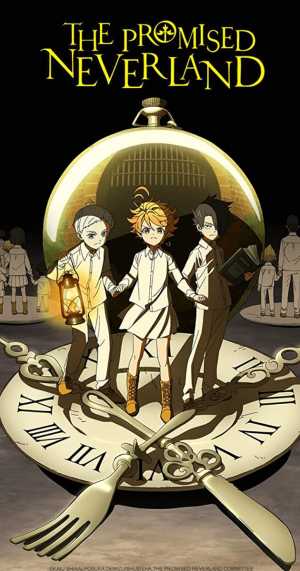
Beneath the surface, The Promised Neverland harbors many secrets, from its premise of child-eating demons and its tumultuous game of survival, yet the unveiling of its antagonist serves as its strongest surprise. Aki from akidearest, a channel that explores Japanese culture and media, illustrates, “She’s someone very clever and no doubt seemed as one of the most notorious mothers out there. 4”
In discovering the truth behind their orphanage, Emma (ID No. 63194), Ray (ID No. 81194), and Norman (ID No. 22194) struggle with the realization of their Mama’s malevolent purpose—Isabella is a human livestock breeder. “Mama is the enemy,” the children are quick to label (121045, Ep 1).
Especially by the end of the season, it’s clear that Isabella is the antagonist as Isabella blocks Emma, Ray, and Norman’s moves to freedom indirectly and actively. While an antagonist can take any form (person or entity), Gabriela Pereira specifies the role as the “protagonist’s worst enemy within the context of the story” 5. Within the boundaries of the Grace Field House, Isabella is the primary opposing force yet outside in their dystopian world, her power diminishes because of her true character to be discussed later on.
As an enemy, is Isabella then a villain? She can be. All villains, whose very nature comes from malice and power, are antagonists; however, not all antagonists are villains 6. It’s arguable to specify that Isabella falls in the latter and that distinction redefines her as a truly compelling character.
True enough, Isabella’s nuanced animosity earned her the award for Best Antagonist among the 2019 anime releases 7. This article will look into how The Promised Neverland reframes Isabella to become an antagonist whose true character is worth sympathizing using a narrative basis of her arc and an exploration of her dimensions, symbolically through Emma and Isabella’s Lullaby, respectively. By doing so, there will be spoilers only for the anime.
73584, Isabella: The Thesis
In his novel, Into the Woods, John Yorke introduces the dialectical basis of narrative that strips the common three-act structure to fundamental arguments—thesis, antithesis, synthesis 8. To understand Isabella is by breaking down her character arc through this dialectical structure. This aids in determining the aspects that urges the audience to view her antagonism with empathy rather than hate.
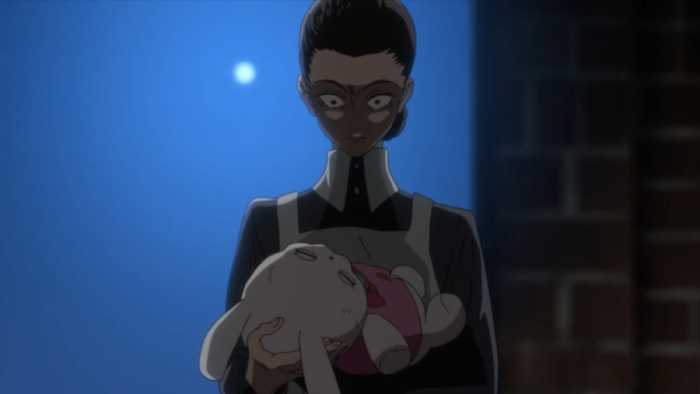
Firstly, the thesis involves introducing and establishing a flawed character. Enter Isabella (ID No. 73584). The children of Grace Field House see their Mama as loving, caring, and kind; perfect and she is. Even as a human livestock breeder, she is coveted by others for her high accomplishments. Yet Isabella is flawed because of her true character “expressed through choice in dilemma” 9.
Die or give birth? Mike furthers that Mama is just as “flawed, scared, and hopeless” 10, especially in a dystopian society where living is a gamble. Before she became the breeder, she was also one of the livestock and upon being given that choice in dilemma, she was afraid of that terrible fate, of dying. Isabella chose to live by joining the system and becoming a mother who commodifies children; her flaw resides within her own survival—her self-serving perspective.
63194, Emma: The Antithesis
This is reinstated and solidified through the existence and confrontation of her antithesis. Enter 11-year-old Emma, who symbolically opposes Isabella in two conflicts: internal and external. The former concerns their different views on family. Much like Mama, Emma, the oldest and one of the smartest children, adores her family at Grace Field House. She is loving, caring, and kind; always the big sister that carries the little ones. Emma represents the altruism that Isabella foregoes.
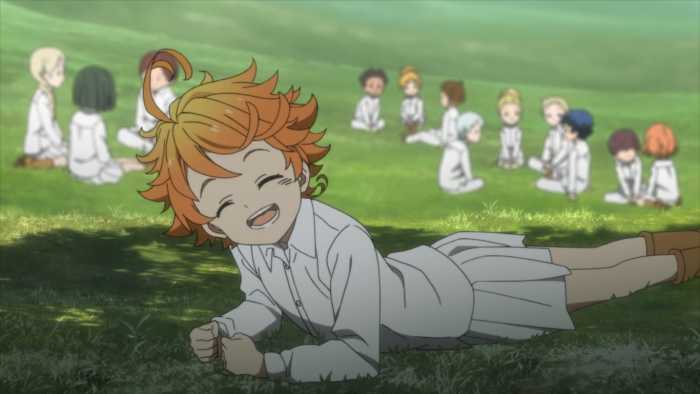
During the initial planning stages of escape, she consistently argues with Ray to bring everybody out despite the risks and convinces Norman to reveal the truth to the younger kids as a sign of trust. In opposition, Isabella perceives loving her children as giving them a full and blessed life before they are inevitably shipped out to their deaths.
On the other hand, the external conflict goes beyond the farm-orphanage to the dystopian world itself. In the system introduced within the 12-episodes of The Promised Neverland, Emma is valuable because she is intelligent and she is female, just as Isabella is. Simply put, they have a higher chance of survival because they can be Mama. When Isabella offers this recommendation, Emma declines and pushes her away; the choice in dilemma. Again, Emma’s selflessness perseveres, putting her family above herself at the cost of the logical route to her own survival.
02:29, Isabella’s Lullaby: The Synthesis
Finally, Isabella’s synthesis parallels how her own theme, Isabella’s Lullaby—an emotionally evoking piece of score by Takihiro Obata—is played and hinted at from the very first episode but only fully realized by the finale. Just as this music can elicit contrasting emotions of grief and love, Isabella manifests her synthesis through her character dimensions that Robert McKee defines simply as “contradiction” 11.

Isabella is a self-serving mother and this is consistent through the 12 episodes. Isabella walks young Conny to her death, humming her lullaby, and with that same gentleness, she cradles the youngest baby in her arms. When one of the children got lost during a game, Isabella heads to the forest and with that same confidence, she pursues Emma and Norman as they scout for their escape.

She gave birth to Ray, confining him to a terrible fate and a short-lived life, because she wants to keep surviving. Isabella’s dimensions make her compelling because “contradictions in nature or behavior rivet the audience’s concentration” 12. It exposes specific questions that the viewer can ask themselves but never truly answer. She explores what the protagonist cannot and therefore, what the audience is curious of. Die or give birth? Live freely under a lie or die knowing the truth? Isabella knows.
Calling back to the earlier question: how is Isabella an antagonist rather than a villain? In a confrontation in the forest, Isabella confesses to Emma and Norman, “Without knowing hunger, coldness, or truth, you can die with a satisfied feeling” (021145, Episode 8). Mama’s intentions do not come from a nature of blatant evil and misuse of power, as villains do 13. Rather she is driven by her dimensions of self-preservation (produce the highest quality product to keep her role as Mama) and motherly altruism (provide a good and peaceful life for her children until their death). And it is in that process that Isabella becomes the protagonist’s (Emma, who responds, “Even if I suffer, I will live freely!) worst enemy.
A product of those dimensions is Isabella’s Lullaby, which is also a section of the anime’s main theme. Quite literally in how Ray, her biological son, hums it himself and how the score swells when Emma and Norman first decide to fight for their escape—Mama’s presence within the children.

But it is figurative and more impactful in how Isabella injects her own memories of unadulterated love and innocence into the piece as it grows from her childhood friend’s simple composition. Even as Mama, the woman she’s grown to be, she continues to hum it to remind herself of her antithesis, the Emma she used to be. Isabella’s Lullaby plays for just two minutes and 29 seconds yet the emotion stretches the music to be as unconditional as Mama’s true love.
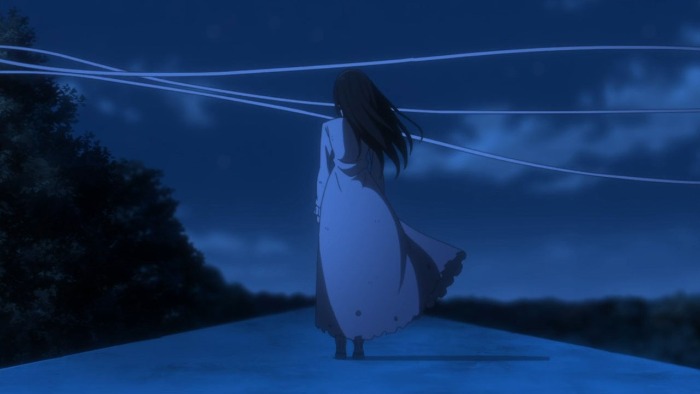
Her synthesis therefore calls to her dimensions: as a mother, accepting that her children are beyond self-serving and letting them go to pursue their own freedom. So when the Lullaby plays over the anime’s final scene, when Isabella offers, “I lost […] I pray that one day you can find true happiness and light,” (150146, Episode 12) to the retreating figures of her children, when Mama smiles from her side of the cliff and waves goodbye, the audience understands that she means it.
Mama is the Antagonist
Initially depicted as the dreaded and impending villain, the monster that watches, Isabella becomes a truly compelling antagonist that graces her audience. In exhibiting her flaw, she becomes a primary opposing force to the protagonists and their journey where her parallelism with Emma highlights her differences in response to conflicts that brings the audience to question.
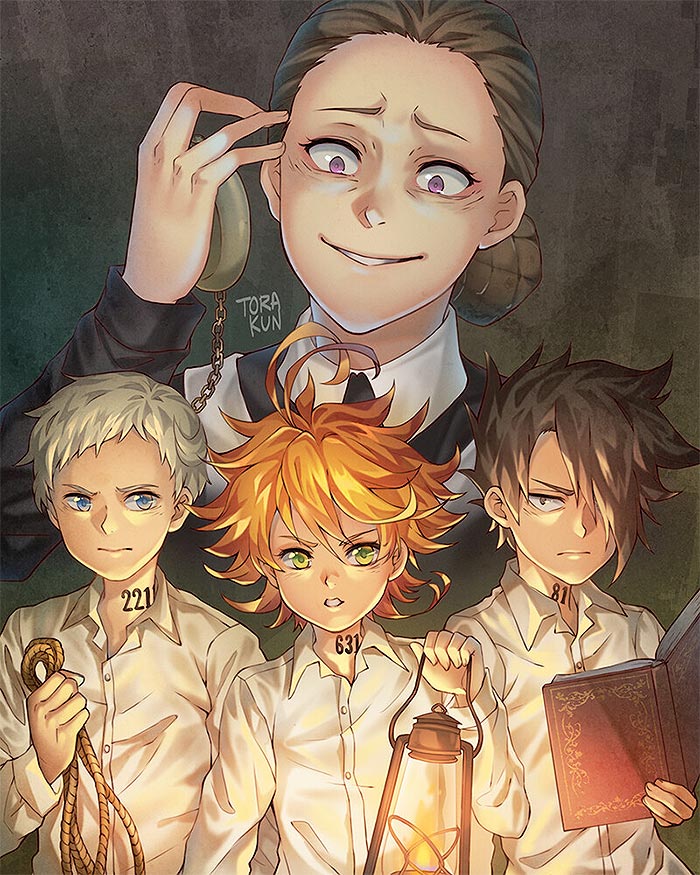
At the final impasse, this ultimately urges Isabella to reevaluate her perspectives as a self-serving mother, musically reinvigorated by Isabella’s Lullaby, that allows her to move past her own flaws and think of her children. Isabella is a surprise that The Promised Neverland brilliantly executes, captivating and breathtaking, just as the sun rises for Emma and the children’s very first morning of their freedom.
Works Cited
- “2020 Anime Awards Winners”. Crunchyroll, https://www.crunchyroll.com/animeawards/winners/index.html ↩
- “The Best Anime of the Decade (2010 – 2019)”. Ign staff, IGN, 2 Jan 2020, https://sea.ign.com/attack-on-titan/156485/feature/the-best-anime-of-the-decade-2010-2019 ↩
- Mike. “The Promised Neverland is WAY Better Than You Think.” Youtube, uploaded by Bonsai Pop, 2 Mar 2019, https://www.youtube.com/watch?v=8sf7h6zgc6U. ↩
- Aki. “This Anime Horrified Me For Weeks -THE PROMISED NEVERLAND.” Youtube, uploaded by akidearest, 8 Apr 2019, https://www.youtube.com/watch?v=XybieuZGoWk ↩
- Pereira, Gabriela. “Villains vs. Antagonists.” DIY MFA, 30 Aug. 2018, diymfa.com/writing/villains-vs-antagonists. ↩
- Thompson, Lauren. “What Is the Difference Between Villain and Antagonist?” Medium, Medium, 25 Feb. 2019, medium.com/@laurenthompson_2288/what-is-the-difference-between-villain-and-antagonist-988fa467b1f3. ↩
- Crunchyroll, “2020 Anime Awards” ↩
- Yorke, John. Into the Woods: A Five Act Journey into Story. London: Particular, 2013. Print. ↩
- McKee, Robert. Story: Substance, Structure, Style and the Principles of Screenwriting. , 1997. Print. ↩
- Mike, “The Promised Neverland is WAY Better Than You Think.” ↩
- Mckee, Robert. Story: Substance, Structure, Style and the Principles of Screenwriting. ↩
- Ibid. ↩
- Thompson, Lauren. “What Is the Difference Between Villain and Antagonist?” ↩
What do you think? Leave a comment.


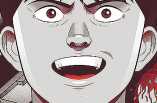

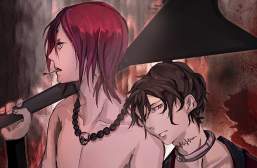
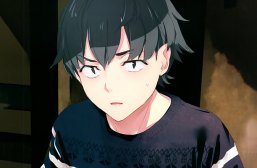
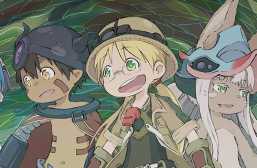
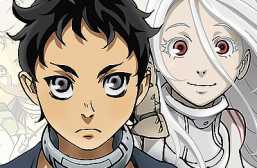
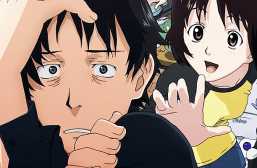
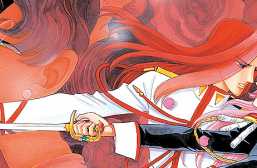
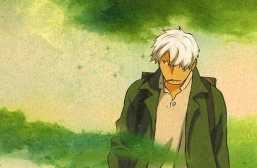
I’m intrigued – I’ve genuinely never heard of anything remotely similar to this. I enjoyed your analysis! 🙂
When Isabelle let her bun loose and wistfully gazed at the forest across her, I was holding my breath. Isabelle always looked clean, precise, and scrupulous in her tight bun. But the moment her long entangled hair glided with the wind, the scene felt raw. It felt genuinely disheveled, gracefully chaotic, and it became clear that her emotions and memories were now deeply intertwined in the core of her character. It was a scene that stuck with me, like a stubborn sticky note, and it truly showed the depth of her character and the quality of the show.
I think Isabella is an amazing character and she definitely isn’t innocent but she did what she had to do and did everything she could to give the children a happy life without sacrificing herself. She isn’t a very kind person but I can see why her past and secrets would drive her to the things she has done.
Who will not go insane after all she went through. This is also the reason why i cant hate her, cause shes out of her mind, in a make believe situation that what shes doing is the best for everyone. She ended up accepting things under the circumstances. If only shes as strong and stubborn as emma…
Those who read or watched the entire manga know that Mama isn’t a psycho , but a broken person who tries to survive and love children as strong as she can.
This anime really went in depth with Isabella’s character. It’s such an emotional thing because while Isabella is a monster who seems to happily and carelessly allow these children to die, she truly does care for them. To her, this is the best possible life she can give them before they’re inevitably sent off to become eaten by forces greater than them that they have no chance of escaping from. She decided that her and everyone else’s fates were set in stone, and did what she could to survive and to give her children the most ideal life she believed they could experience.
Good article on a clearly multifaceted antagonist. She reminds me somewhat of the Other Mother from Coraline.
That’s a good comparison, Stephanie. If you get a chance, do watch the series.
Thank you for introducing me to an anime series I might easily have overlooked. Isabella is a fascinating character and certainly well developed, but, in my opinion, she is still, essentially, a colaborator and an accessory before, during and after the fact. I have no sympathy for her.
I find it particularly interesting that this series has appeared now, as more and more accounts are appearing about widespread child abuse. Whether we choose to believe these accounts or not is irrelevant. The point is the issue is entering mainstream consciousness and awakening many to the horror some children have to endure everyday. Overlook the more fantastical aspects of The Promised Neverland and we can see the children are considered to be no more than product.
Thank you for the great analysis and I really enjoyed helping during the editorial stage. You’ve created a new fan of the series. I’m eager for the next season – let’s see if Norman still has a trick or two up his sleeve!
An interesting essay.
I really love this anime. It brings me such stress and hopelessness. It almost feels like it’s going to be impossible for them to escape, and it leaves me stressing out over how they plan to do it. Idk man, the feeling of showing us a group of kids who find out that all they can trust is fake and actually planning against them, it’s scary.
I honestly never disliked Isabella, you could tell that she actually did love all the orphans but she was trapped and unable escape from her hell, they even gave small hints of her humanity and love for them. Like when she looks saddened when she see’s a despaired Emma sobbing on the bed that Norman isn’t with them anymore, you could tell that she wanted to comfort her but because of the system she was put in and the role she had adopted from Emma and the others it would’ve been of no use, since Emma would’ve seen it as being manipulative and apathetic, she even comforted phill at the end that they escaped and she seemed happy and content with that even tho she failed one of her responsibilities as a “mother”.
It was almost like she wanted them to escape and gather the strength and use it to survive. Since she couldn’t when she was a kid as she had nobody else after leslie’s untimely death, she was depressed and torn, her mother even took advantage of that and offered her a role as a mother which she couldn’t refuse, since she lost the one person she truly loved and was a slave to the system she was put in.
Sometimes I wonder what would have happened if Emma had actually become a mom. I know that she wouldn’t either way, but it makes me think that she would be a very different person. Maybe she would have turned insane and just like Isabella.
All Ive been thinking throughout this anime is “Damn, they’re 11.”
I love Isabella so much. She’s so we’ll written and well constructed. I hope we see more of her future seasons.
I think Isabella insists that Emma give up escaping and instead become a mama because when it was her, she decided to give up and become a mama because she saw no hope of escaping. By making Emma also fail, she reassures herself that she had no other choice, and perhaps the sadness that comes with realizing that she indeed could have found a way as well, is what makes her look so defeated as she looks at the other side of the cliff.
Imo Promised Neverland had a solid story BUT… Emma.. Emma is a HUGE problem. Her character is just… so bad. In a world as dark as this for someone to NEVER have shift in motivations? C’mon.. It gets really annoying. The further I got into the series the more I was hoping she would be killed and devoured somehow. It was… morbid for me to want out of a character but her character has 0 progression and has 0 development. Which becomes really boring.
Pathetic. You’re a fool. Emma constantly adapted and made compromises with her previous beliefs and ideas throughout the story. She went from a pure idealist, then became a ruthless realist and accepted that death and killing were necessarry. And finally she became one who questioned both idealism and realism, choosing to try and find another way to reach her goals without killing everyone considered her “enemy.”
Holding onto one’s true values and goals without giving up Is development of strong character.
I saw the first episode and i found it so good that i needed to read the manga right away, i finished it off before the second episode came out, and its one of the best i have ever seen, just a few problems with deus ex-machina and not knowing when to let a character die i would say.
My expectations on the anime where enormous, but when i saw the second and third episode i was so disappointed, it didn’t really feel like the manga, it doesn’t have that tension or that mind games build up that the manga used brilliantly, sister krone came just to early and doesn’t feel like a smart character, beside that the music and some scenes really feel off, like the tag game, in the manga the kids were practicing for days before sister plays with them and crushing their efforts, and in the end it doesn’t show the capability of the the geniuses of the house.
At least for my the anime doesn’t show at all how smart emma, norman and ray are.
I don’t know how much Isabella really cared about the children? We can’t forget she broke Emma’s leg and threatened to kill her. She also smiled while telling her own son she was going to ship him out.
Maybe she was bipolar as hell and really was stuck in between wanting to help her kids and saving her own life.
I’m actually positive if she wasn’t a villain she could have escaped with the kids after coming to some agreement with the children could of been on the run and could have returned to end the system upon returning to save the other kids I mean she wasn’t entirely bad but wasn’t good though at the end of season 1 it looked like she changed to good hopefully if she does return in the series she’d be on the kids side then.
Actually if she went with them she would die… i heard that human died after they escape outside their heart stop and they die.. i mean adults they put inside them smt ..you can notice that karone had a surgery and she showed the kids the mark on her chest.
I think that the reason isabelle is harsh to the kids is one, it is because of survival i think if she broke some rules to the system they will kill her, two, she wants them to feel what she felt when she was younger she was hopeless and gave up knowing that her friend leslie was kiled by the demons I think she loved the children but she can’t do anything so thats why she just kept their toys.
Isabella is one of the best characters in anime for me. She’s not evil. She just wants survival and in fact loves her children dearly and cherish each one of them for the brief moment their on her care.
She reluctantly tried to stop Emma and the kids because deep in inside she wanted to escape too.
This is one hell of an essay. Love this anime!
I cried in the end of the anime, not for norman, not for the kids, but for her… i just feel sorry for her the most because she ends up just giving up, letting the emotional stress eat her and makes her that way. But Im happy that after everything, her good side prevails. Shes actually my 2nd fave, next to emma.
I can’t really ever get too scared of anime horrors.
I don’t find The Promised Neverland scary, I’m really sensitive to disfigurement and big wounds, but this applies practically only irl. I think this is an amazing anime (I’m even reading the manga), it keeps me on edge, kind of. But I don’t find it really scary.
It’s always fascinating to see villains who think they’re helping people even as they participate in the most evil sorts of activities. I also like seeing villains who aren’t entirely beyond saving, since it raises genuine questions about what they will do next. That being said, the mere fact that “The Promised Neverland” has such a well-realized female antagonist is already a huge plus, because it seems to me that the villains occupying the commanding heights of the anime fan’s imagination are nearly always men. I’ve even seen stories that have quite well-written female villains where they still end up being overshadowed by even more interesting male villains! So, as I explore anime I’m always on the lookout for female villains that can truly make an impact on their own.
This article made me want to go watch the show (up to episode 4 as of me writing this). Thank you.
This was the first anime that has ever made me cry.
I feel sorry for her than hate her. She’s only a hopeless woman living in a cruel word without escape. She does love them but she has to do her job to survive. The only thing she can do is to give her kids the happiest, longest life as much as possible before they are “getting harvested”
In the end, when they did escaped, she gave up on surviving and there’s only love inside her. You can see it at her eyes and her smile in anime or throught her words in manga. Isabella is one of my fav character.
Sadly she doesn’t appear in the series in the manga after the escape arc.
Watching this makes me feel better about the anime. I honestly thought it was an “okay” anime. Not the best, but it had good moments.
Thank you so much for making such a great analysis on Isabella! It’s my favorite talking point for this series.
I finished this anime yesterday and was bawling during all of episode 10-12. but the part where i was actually sobbung was when emma finally escaped and when isabella’s past was shown. it broke me literally.
I am an anime fan and personally like Death note but after reading your article, I think I must watch promised neverland. Your analysis about every character of this anime specially Isabally is really nice.
TPN wouldn’t be the same without Isabella and the contrast between her sweet exterior and more malicious interior, and I appreciated the last few episodes’ attempt to further flesh out her character and reasons for being the way she is. Goes to show how external pressure can render an individual deprived of their agency and put them on a razor’s edge.
I really enjoyed this anime. It was fresh and the world they created was terrifying and awesome.
I can’t wait for the anime to catch up with the manga so i can see everybody lose their shit.
So many people not understanding how Isabella is indeed another victim of the system.
I love this series sooo much! The anime adaptation was a masterpiece!
Wow this is amazing! I was the one who suggested the topic and I feel as if I almost wrote this! You captured the interesting and intriguing personality of Mama so well. I am so glad you included the lullaby. I think what makes this anime so compelling is how so “realistic” this dystopia can be. So many dark themes can be applied to our lives and past history as humanity. Interesting how even though she is the “enemy” her story is so human and how “Emma” is her foil is so many ways. Wonderful work!
Having a whole formal analysis written about an anime really surprises me, although TPN is a really good choice since many of the characters undergo amazing development which leaves so much room for interpretation
It is so easy to paint an antagonist as a villain, or a villain as a bad person, but the layering of the characterization in this show is refreshing. Understanding how characters become who they are is imperative understanding the narrative. Wonderful piece!
Very dark anime; interesting Hegelian dialect.
Very interesting and well-written! I almost cried out loud when Mama dies.
Very well written, perfectly capturing Isabella. With Krone arc and Isabella’s development, I found similarities to current disconnect of youth and adults in the modern age. The layers written into the characters blur the line between good and bad and your quote “not all antagonists are villains” is a beautiful summary of the writing. Hoping to get the manga soon, as the anime ended on such a cliff hangar, I itch for more of Kaiu Shirai writing!
I really enjoyed your analysis.
Well written! It’s the juxtaposition of the ideals and values that Emma and Mama hold that illustrate why she is the antagonist of the story.
Interesting analysis, but one that I do agree with. The show did have such precision and well crafted characters. It’s a pity it ended the way it did. So many opportunities that weren’t realized. An abrupt, almost rushed ending that did leave fans hanging and hoping for more, but sadly not getting it.